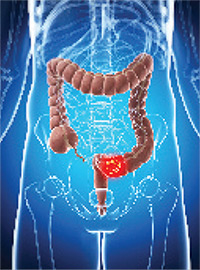A Genetic Link Between Prostate Cancer and Colon Cancer
 A 2010 study at the University of Buffalo found that men with prostate cancer had more abnormal colon polyps than men without prostate cancer (48% vs. 30.8%), putting them at higher risk of developing colon cancer.1
A 2010 study at the University of Buffalo found that men with prostate cancer had more abnormal colon polyps than men without prostate cancer (48% vs. 30.8%), putting them at higher risk of developing colon cancer.1
An Australian study published in 2003 found that men with colorectal cancer are predisposed to prostate cancer.2 The risk was greatest in men who were younger than 65 years when they developed colorectal cancer. In this group, men with colon cancer were 1.8 times more likely to be later diagnosed with prostate cancer, and men with rectal cancer were 2.1 times more likely to be diagnosed with prostate cancer.
A genetic explanation
In recent years, scientists have turned to genetics as a possible explanation for this connection. A family history of prostate or colon cancer could increase the risk of developing these diseases, possibly due to inherited gene mutations.
Several studies have found a location on the 8q24 gene that increases risk for both prostate and colon cancer.3 A study from Dr. Catalona’s research group examined prostate cancer risk alleles in the 8q24 gene location and their association with other types of cancer.4 An allele is an alternative form of a gene that arises by mutation at the same place on a chromosome.
Screening for early diagnosis
Like men with early-stage prostate cancer, most people with early-stage colon cancer do not have any symptoms of the disease. Thus, regular screening for these diseases is important. We encourage you to discuss the appropriate age to begin screening for colorectal cancer with your doctor.
- Presented at the American College of Gastroenterology Meeting, 2010.
- Moot A. et al. Men with colorectal cancer are predisposed to prostate cancer. ANZ J. Surg. 2003; 5(73):289-93
- Ahmadiyeh N. et al. 8q24 prostate, breast, and colon cancer risk lock show tissue-specific long- range interaction with MYC. PNAS. 2010; 107(21):9742-46
- Cooper P. et al. Prostate Cancer Risk Alleles and Their Associations With Other Malignancies. Urology. 2011; 78(4):970e15-20











